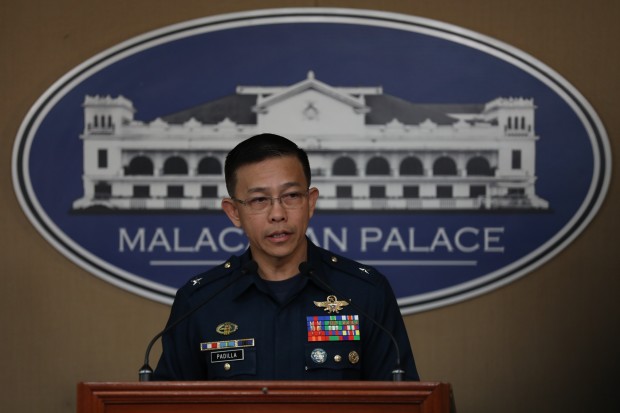No destabilization threat to Duterte administration, says AFP

Armed Forces of the Philippines Spokesperson Brig. Gen. Restituto Padilla FILE PHOTO / TOTO LOZANO / MALACANANG
The military sees no major threat to the administration, despite President Rodrigo Duterte’s continued reference to destabilization efforts that he says could push him to set up a revolutionary government.
Maj. Gen. Restituto Padilla, spokesperson for the Armed Forces of the Philippines, said the military was focused on addressing threats from terrorist groups.
The military is conducting minimal monitoring in other parts of the archipelago, in coordination with the police, Padilla said.
“So far, based on the last assessment that we saw and was mentioned by [Defense] Secretary [Delfin] Lorenzana the other week, we see no major threat,” Padilla said in a press briefing in Malacañang.
“So I don’t know how much evolved the other threats have in the last few days or the last weeks. Then other agencies may have to answer that,” he added.
Article continues after this advertisementConspiracy?
Article continues after this advertisementMr. Duterte earlier said the Reds and the “yellows,” a reference to communist rebels and members of the opposition Liberal Party, were conspiring against him, an allegation that both groups had denied.
The President on Thursday also mentioned that the US Central Intelligence Agency was out to get him, saying that if he died, the United States and the CIA would be to blame.
In an interview taped the same day, Mr. Duterte warned that he would declare a revolutionary government if his critics’ attempts to destabilize the administration escalated, and have the involved parties arrested.
The President has access to sources of information not available to others, with regard to his statements on destabilization attempts, presidential spokesperson Ernesto Abella said on Tuesday.
“As he speaks, he stands on his own personally considered evidence,” Abella said.
All-encompassing info
Padilla also said the information that went to the President was all-encompassing and that the military was just providing part of the intelligence information being gathered.
But during national security meetings, the various information gathered are pieced together, he added.
The President, though, has yet to forward to the military the recent information he has about the New People’s Army (NPA) and the CIA efforts, according to Padilla. The NPA is the armed wing of the Communist Party of the Philippines.
Padilla nevertheless said the military was monitoring the NPA because its activities could sabotage infrastructure projects and agricultural programs, which could affect national security.
As to Mr. Duterte’s warning that he would set up a revolutionary government, Abella said the President was just laying down the premise of what could happen if and when efforts to unseat him led to anarchy.
“The administration is duty-bound to protect the state and especially in his case, he wants to protect the integrity of the next generation. He’s perfectly within his rights and jurisdiction to be able to say, ‘I’m protecting the grounds already won for the next generation,’” he said.